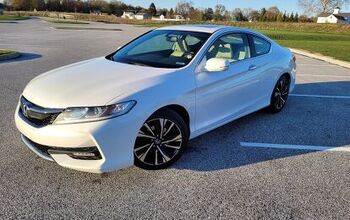EU Faults BMW, Daimler, Volkswagen With Emissions Collusion

It might have taken two years of investigative raids and Daimler acting as a whistleblower, but Germany’s Big Three automakers finally stand accused by the European Union of collusion. On Friday, the European Commission claimed that Volkswagen Group, BMW and Daimler broke antitrust rules by acting together to delay the introduction of two emission cleaning systems between 2006 and 2014.
The Commission’s preliminary view is that BMW, Daimler and VW participated in a collusive scheme, breaching the EU’s competition rules by limiting the development and proliferation of new emission cleaning technology for diesel and gasoline-fueled passenger cars sold in the “European Economic Area.” This collusion occurred in the framework of the car manufacturers’ so-called “circle of five” technical meetings — which includes VW Group’s Porsche and Audi.
“Companies can cooperate in many ways to improve the quality of their products. However, EU competition rules do not allow them to collude on exactly the opposite: not to improve their products, not to compete on quality,” said European Competition Commissioner Margrethe Vestager in a statement.
“We are concerned that this is what happened in this case and that Daimler, VW and BMW may have broken EU competition rules. As a result, European consumers may have been denied the opportunity to buy cars with the best available technology. The three car manufacturers now have the opportunity to respond to our findings.”
The EU is most concerned with selective catalytic reduction systems, which reduce nitrogen oxides from diesel emissions, and “Otto” filters that minimize particulate matter emissions from gasoline-powered vehicles.
From the European Commission:
In October 2017, the Commission carried out “inspections” of BMW, Daimler, VW and Audi in Germany, as part of its initial inquiries into possible collusion between car manufacturers on the technological development of passenger cars. The Commission opened an in-depth investigation in September 2018.
A Statement of Objections is a formal step in Commission investigations into suspected violations of EU antitrust rules. The Commission informs the parties concerned in writing of the objections raised against them. The parties can then examine the documents in the Commission’s investigation file, reply in writing and request an oral hearing to present their comments on the case before representatives of the Commission and national competition authorities.
The EU said it could impose a fine of up to 10 percent of a company’s annual turnover if the Commission concludes there is sufficient evidence of an infringement of its rules.
Daimler is likely very surprised by this, as it has repeatedly stated its status as a whistleblower would absolve it of any legal ramifications. While VW has made no official comment, BMW said it is still investigating the claims against it. However, it also adopted a more confrontational stance, saying, “The BMW Group regards these proceedings as an attempt to equate permissible coordination of industry positions regarding the regulatory framework with unlawful cartel agreements.”
[Image: LanaElcova/Shutterstock]

A staunch consumer advocate tracking industry trends and regulation. Before joining TTAC, Matt spent a decade working for marketing and research firms based in NYC. Clients included several of the world’s largest automakers, global tire brands, and aftermarket part suppliers. Dissatisfied with the corporate world and resentful of having to wear suits everyday, he pivoted to writing about cars. Since then, that man has become an ardent supporter of the right-to-repair movement, been interviewed on the auto industry by national radio broadcasts, driven more rental cars than anyone ever should, participated in amateur rallying events, and received the requisite minimum training as sanctioned by the SCCA. Handy with a wrench, Matt grew up surrounded by Detroit auto workers and managed to get a pizza delivery job before he was legally eligible. He later found himself driving box trucks through Manhattan, guaranteeing future sympathy for actual truckers. He continues to conduct research pertaining to the automotive sector as an independent contractor and has since moved back to his native Michigan, closer to where the cars are born. A contrarian, Matt claims to prefer understeer — stating that front and all-wheel drive vehicles cater best to his driving style.
More by Matt Posky
Latest Car Reviews
Read moreLatest Product Reviews
Read moreRecent Comments
- Spectator This was an amazing vehicle. Back then Acura knew how to make a plush and comfy seat!
- Syke F1 fan and normally watch every race, although most of them are DVR'd. I've got my Xfinity box set up to record everything automatically. This past Sunday I watched the race live for a change.
- Jalop1991 There is no inflation. Everything is cheaper than it was 5 years ago. SHRIMP AND GRITS!
- ChristianWimmer Exterior and interior look pretty flawless for such a high mileage car. To me this is an indication that it was well-maintained and driven responsibly. It’s not my cup of tea but it’s bound to find an enthusiastic owner out there.And with ANY car, always budget for maintenance.
- Fred I'm a fan and watch every race. I've missed a few of the live races, but ESPN repeats them during more reasonable hours.


































Comments
Join the conversation
I'm confused - I was told conspiracies never happen, anywhere, ever.
No collusion. Witch hunt. Total exoneration. Etc.